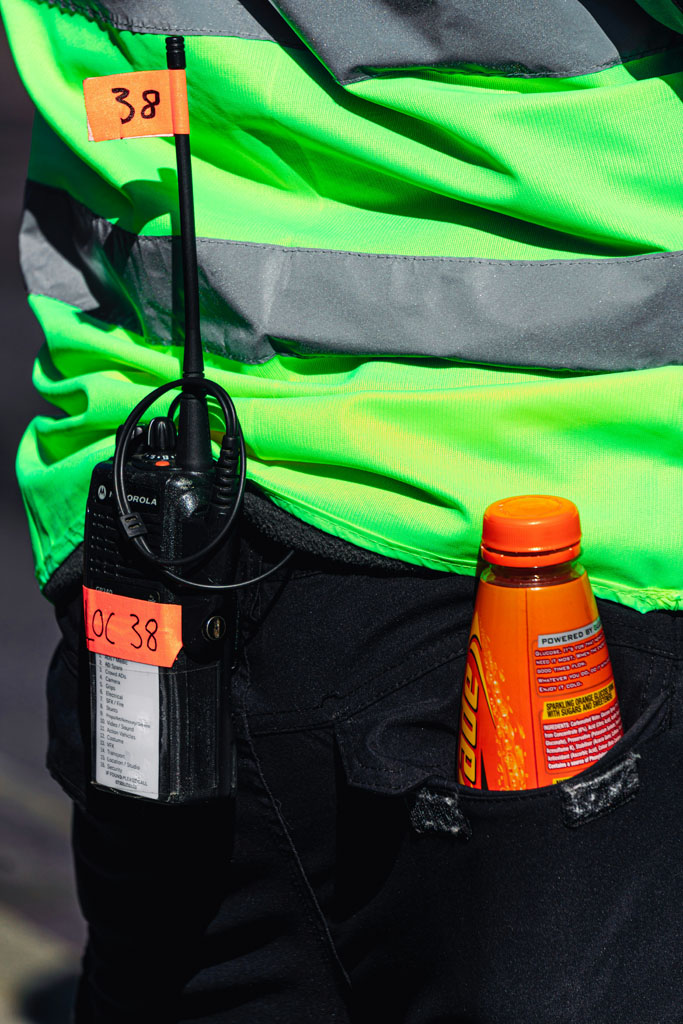News
26 Sep 2025
Talking through your squelch

Subscribe to CX E-News
Alpha Radio Sierra Echo
Comms check from follow-spot 3.
Reading you 5 out of 5. How do you read us?
5 x 5 buddy. Spot 3 out.
Roger that.
There are many different ways to communicate with the world around you. The above example is a universally accepted way of using RF comms for interactions in emergency service and military spheres, since adapted for civilian use. It is designed for maximum information using minimal airtime. It works well if everyone adheres to the conventions. It also falls over when too many people are trying to talk over each other and using non-standard protocols (or none at all).
This underlies the need to understand your communication platform before using it. Knowing its limits, you can leverage strengths and mitigate weaknesses. Same with all tools – use them well and they will be your friend. Conversely, use them poorly and they will bite you. There aint nothing quite so embarrassing (or career damaging) as a ‘Send All’ email that should have been kept as an internal monologue.
Protocols and procedures are the rules of engagement when it comes to comms. In some scenarios they are necessarily strict, in others, somewhat looser. Think military command and control in a war environment versus chit-chat between spot-ops on LX comms. Of course, some users will follow the rules better than others but, for the most part, these guidelines set the general tone. Bagging out the LD when they are secretly listening in to pre-show banter might cost you a job but it’s nothing like taking cover because you know the artillery is coming in hot.
Platforms are not just shoes
Telephones attached to the wall, letters written in cursive longhand, and other tech of yore has ceded to email, chat forums, and Discord servers. These vary widely and wildly in how they set their codes of behaviour. Much of this is down to the owners and their moderators. The well run (and reasonably strict) arenas stay civil and naughty participants get swiftly banished. This moderation approach works ok on some forums but is not possible for mechanisms like email servers, listservs and the like.
Wireless show comms, high-definition audio transmissions, near field equipment updates and charging, unshackled performers no longer tangling in mic leads – these are all major quality of life improvements for the live audio scene. For all its faults, the industry has made a reasonable fist of standardising on techs, protocols and modus.

Moderate … or uncontrolled?
Moderation is a double-edged sword for me. I’ve been online community cop more than once and still deal with awkward mental flotsam and emotional scars from the experience.
But many platforms really need concerted moderation. This is more a social limit than technical constraint. With little exception, this boundary is set for a particular user or group that thinks that they are above all rules.
Those that like bending the social norms will find technical flaws to exploit in this game. Everyone clicks ‘yes’ to the terms and conditions. Not all follow them.
I do feel for the poor folk who are employed as moderators by the major social media outlets and the moral detritus of raw internet sewerage that they have to wade through every day. May their souls stay strong in the face of such fetid evil.
Is it coincidental that Social Media and Sado Masochism share the same initials?
Most ‘no holds barred’ venues quickly devolve into hateful troll-fests where the shoutier voices drown out any modicum of common sense. If you enjoy that drama, good for you.
A nearby town has two different FB groups. There is the respectful, moderated one with lots of useful, if dry, community information. Then there is the unrestricted FB group. Unsurprisingly, it is a hotbed of conspiracy cranks, flat earthers and Sky News refugees. I happily ignore them both.
For the rest of us, when things devolve too much, we will migrate to another platform where decorum is a little more controlled. Until it gets overrun by attention seeking nasties, then off we head to the next promised land before it gets all X-itty too. Rinse and repeat.
Some comms are more equal than others
WMAS is an absolute breath of fresh air for live wireless transmissions. Anyone who remembers taxi radios coming across the PA when more than a small handful of radio mics were active will second this. Multiple available channels, high bandwidth, stable transmissions without overlap or conflict – what a dream last century.
Apart from the ubiquitous Internet and its multi-faceted multiplicity, modern comms have some real upsides. Not the least of which are the emergency locator technologies like PLB and EPIRB that continue to save lives on a regular basis. I have two friends still alive due to this magic gimcrackery.
Other contemporary improvements such as digital radio, texting, streaming, and real time emergency alerts have been a great way to share instantaneous information. Remote surgery over the Internet would have to be one of the greatest.
Personal tracking is all good when you want to know where the kids are but not so pleasant when a nasty ex is cyber stalking. Social media in general seems to have this dilemma of reward versus risk.
In light of all the potential pitfalls, I’ve set up a series of conventions for my interactions online.
- Rule #1: If in doubt, say nothing.
- Rule #2: Would you like this said about you? No, then say nothing.
- Rule #3: Learn the conventions of each medium and stick to them – it will make it so much easier for everyone in that group. You included.
- Rule #4: Leave the world a better place than when you found it.
- Rule #5: Nuance is easier conveyed in person. Keep it calm, clear and concise when at the keyboard.
Screeching from the soapbox
From smoke signals and songlines to DMs and tweets, your ability to share information with your world depends on using instrumentalities correctly. Like all formalities, there are ways to bend the edges, and this suits the cheeky among us (me included), but smart punters know when to push boundaries and when to stay within accepted lines.
Anyone who has switched on a CB radio will know the terror of channel 40 – the trucker’s channel. I call it channel PHUQN, cos that’s what it sounds like. I sometimes put it on for some lowbrow entertainment while travelling down the highway. The sweary rant factor increases in intensity and volume the closer to the big city you get. When there is more f.p.m. than even Samuel L. Jackson could muster, it’s time to switch to the radio. Yay, NWA on RRR!
Ovaries and outies.
– mic drop.
Subscribe
Published monthly since 1991, our famous AV industry magazine is free for download or pay for print. Subscribers also receive CX News, our free weekly email with the latest industry news and jobs.






